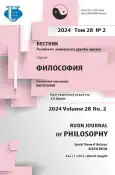Divine Nature Under Scrutiny: Rethinking the Problem of Evil in the Light of Modern Philosophical Discourse
- Authors: Adeoye M.A.1
-
Affiliations:
- University of Religions and Denominations
- Issue: Vol 28, No 2 (2024): KANT IN RUSSIA
- Pages: 543-557
- Section: PHILOSOPHY OF RELIGION
- URL: https://journal-vniispk.ru/2313-2302/article/view/325434
- DOI: https://doi.org/10.22363/2313-2302-2024-28-2-543-557
- EDN: https://elibrary.ru/UGEKQV
- ID: 325434
Cite item
Full Text
Abstract
This study aims to provide fresh insight into the issue and possible solutions by analyzing the philosophical arguments and counterarguments around it. The Problem of Evil has long been a significant challenge for philosophers and theologians, as it presents a paradox between hostility and an omnipotent, benevolent supreme being. Despite centuries of theodicies and defenses, the problem remains a central concern in philosophical and theological discourse. Modern philosophical thought has brought new perspectives and insights to the problem, with philosophers like Alvin Plantinga, Marilyn McCord Adams, and Eleonore Stump offering nuanced analyses of evil and its compatibility with divine attributes. Their work has prompted a reevaluation of traditional theological assumptions and opened new avenues for exploring the complexities of evil and divine nature. The Problem of Evil has profound implications for our broader theological understanding of God and the world. It shapes our ideals about God’s nature, human cooperation, morality, and the character of the universe. To address these challenges, we must continue to explore and engage with contemporary philosophical perspectives. By drawing on present-day thinkers’ insights and engaging with evil’s complexities in new and revolutionary ways, we can enhance our theological discourse and deepen our knowledge of the divine. In conclusion, the Problem of Evil remains a vexing and profound challenge for believers and thinkers alike. By embracing the insights of modern philosophical discourse and committing to ongoing dialogue and reflection, we can begin to rethink our understanding of divine nature in the face of evil.
About the authors
Moses A. Adeoye
University of Religions and Denominations
Author for correspondence.
Email: princeadelekm@gmail.com
ORCID iD: 0000-0003-0755-3532
Research Fellow, Department of Religious Studies, Faculty of Philosophy and Theology
3749113357, Qom, IranReferences
- Svendsen LFH. A Philosophy of Evil. Dalkey Archive Press; 2010.
- McGrath AE. Historical Theology: An introduction to the History of Christian Thought. John Wiley and Sons; 2022.
- Surin K. Theology and the Problem of Evil. Wipf and Stock Publishers; 2004.
- Russell L. Evil: A Philosophical Investigation. Oxford University Press; 2014.
- Field H. Epistemology without metaphysics. Philosophical Studies. 2009;(143):249-290.
- Audi R. Epistemology: A Contemporary Introduction to the Theory of Knowledge. Routledge; 2010.
- Graff HJ. Undisciplining Knowledge: Interdisciplinarity In the Twentieth Century. JHU Press; 2015.
- Njoroge JM. The Refutation of Scientism as An Ideology Through the Life and Writings of Lewis C.S. Thesis Ad Doctoratum. In: Philosophia Totaliter Edita ROMAE; 2023.
- Meister C, and Dew JrJK, editors. God and the Problem of Evil: Five Views. InterVarsity Press; 2017.
- Jones C. Why Does God Allow Evil? Compelling Answers for Life’s Toughest Questions. Harvest House Publishers; 2017.
- Peterson ML. The Problem of Evil. The Oxford Handbook of Atheism; 2013.
- Morris TV. Our Idea of God: An Introduction to Philosophical Theology. Regent College Publishing; 2002.
- Kizilos T. God and the Problem of Evil. Lulu; 2008.
- Swinburne R. Providence and the Problem of Evil. OUP Oxford; 1998.
- Clendenin DB. God Is Great, God Is Good Questions About Evil. Ashland Theological Journal.1992;(24):35-54.
- Laato A, de Moor J, editors. Theodicy in the World of the Bible: The Goodness of God and the Problem of Evil. Brill; 2021.
- Lara MP, editors. Rethinking Evil: Contemporary Perspectives. University of California Press; 2001.
- Bergmann M. Skeptical Theism and Rowe’s New Evidential Argument from Evil. Nous. 2001;35(2):278-296.
- Daeley JJ. Why God Must Do What Is Best: A Philosophical Investigation of Theistic Optimism. 2021:1-208.
- Taliaferro C. Consciousness and the Mind of God. Cambridge University Press; 1994.
- Sagi A. Albert Camus and the Philosophy of the Absurd. Rodopi; 2002.
- Gruenler RG. The Inexhaustible God: Biblical Faith and the Challenge of Process Theism. Wipf and Stock Publishers; 2020.
- Jaba M. An Investigation into the Timelessness of God Theology, with Special Reference to African Traditional Religion; 2023.
- Lindeman M, Pyysiäinen I, Saariluoma P. Representing god. Papers on Social Representations. 2002;(1):1-13.
- Ouma GO. A Philosophical and Theological Response to The Problem of Evil: A Focus on The Mental, Moral, Natural Problem of Evil in The Luo Cosmology (Doctoral dissertation).
- Leaman O. Evil and Suffering in Jewish Philosophy. Cambridge University Press; 1995.
- Peterson ML, editor. The Problem of Evil: Selected Readings. University of Notre Dame Press; 2016.
- Itene M. The Problem of Evil in the Face of a Benevolent God: Intricacies of Philosophico-Theological Theodicy. Albertine Journal of Philosophy. 2022;6(1).
- Berthold JrF. God, Evil, and Human Learning: A Critique and Revision of the Free Will Defense in Theodicy. State University of New York Press; 2012.
- Geivett RD. Evil and the Evidence for God: The Challenge of John Hick’s Theodicy. Temple University Press; 1995.
- Evans CS. Natural Signs and Knowledge of God: A New Look at Theistic Arguments. Oxford University Press; 2010.
- Słowikowski A. Existential Theodicy as a Response to the Limits of Classic Theodicy based on Kierkegaard’s Religious Writings. International Journal of Systematic Theology. 2022;24(2):212-236.
- Kelly JI. Giving Evil Its Due: Radical Evil and The Limits of Philosophy (Doctoral dissertation). Berkeley: University of California; 2014.
- Flescher AM. Moral Evil. Georgetown University Press; 2013.
- Green RM. Kierkegaard and Kant: The Hidden Debt. State University of New York Press; 1992.
- Van Inwagen P. The problem of Evil. OUP Oxford; 2006.
- Bishop JC, Perszyk KJ. God, Purpose, and Reality: A Euteleological Understanding of Theism. Oxford University Press; 2023.
- Cooper-White P. Braided Selves: Collected Essays on Multiplicity, God, and Persons. Wipf and Stock Publishers; 2011.
Supplementary files









